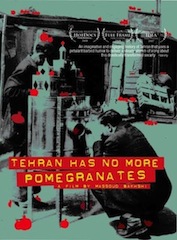Event

Blake Atwood
The Aesthetics of Reform: Film and Politics in Post-Khomeini Iran
Scholars have recognized the special relationship between Iranian cinema and Mohmmad Khatami, who was the face of reform in Iran during his presidency (1997-2005). The current accounts identify this relationship in permissive terms, noting Iranian filmmakers’ support of Khatami during his campaigning efforts and the liberal cultural atmosphere that Khatami fostered during his presidency. However, my research indicates that this relationship is much more complicated than modes of permissibility. Cinema and Khatami’s Reformist Movement crucially informed one another, and their dynamic functioned on an ideological level. During this talk, I will examine Mohsen Makhmalbaf’s Time for Love (1991), Bahman Farmanara’s Smell of Camphor, Fragrance of Jasmine (2000), and Masoud Bakhshi’s Tehran Has No More Pomegranates (2007) in order to prove that certain films and filmmakers, more than just benefitting from the Reformist Movement, helped to shape its political platform. I draw on these three examples to demonstrate that a new reformist aesthetic has emerged in Iranian cinema in order to articulate this complex relationship. This new aesthetic includes a revival of mystic love, the use of Tehran as a metaphoric site of social and structural reformation, reconfigurations of perceptions of time, and the democratization of filmmaking through digital video. The Reformist Movement, therefore, marked a change on Iran’s political landscape at the same time that it signaled a new trend in the country’s cinematic history.



